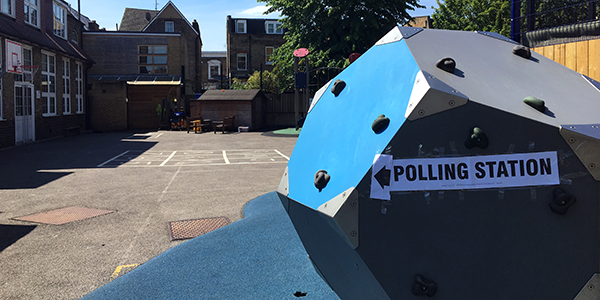General election 2019: why school buildings need to be used as polling stations
The last time the UK held an election in December was 1923. As preparations are made for a snap election, and despite the logistical problems this might cause, Toby James explains why schools should, as usual, be used at election time, as a government minister and electoral officials clash.

Polling station in local school. Picture: Alice Park
Christmas arguments may sometimes include debates about whether to watch the Queen’s Speech or not, or whether stockings belong on the fireplace or the end of the bed, but they now include another one: whether to relinquish school buildings to serve as polling stations.
Education Minister Gavin Williamson started a Christmas-spat with a letter to all local authority chief executives asking them not to cause the cancellation of nativity plays or carol concerts. It brought a forceful response from the returning officers. The Association of Electoral Administrators wrote that the minister’s comments were ‘unhelpful’. The letter came, they argued, after many polling stations had been booked and ‘members have been working tirelessly to negotiate access to all venues designated as polling places, which is both time consuming and difficult.’
As someone who has children at school, I can appreciate the challenge for parents and for teachers. When the date is in the diary for a nativity play, childcare arrangements are made around it and teaching plans are fixed. But this is an election that will affect the futures of the children in these schools much more than anyone else. What’s decided on Brexit, the NHS and the environment will shape their future. It is therefore vitally important that the election is well delivered. Citizens need to have confidence in the result and no one should be unfairly disadvantaged in their attempts to cast their ballot.
For these reasons, polling stations are carefully selected following consultation. There is a formal process called a Polling Station Review in which all possible locations are identified and assessed. There is a consultation and an opportunity for citizens and parties to respond and even appeal the chosen sites.
This is an important process because the location of a polling station can have a major effect on an election and levels of participation. If voters are asked to travel long distances, then they might be less likely to vote. If polling stations do not meet accessibility requirements then the system will be failing many citizens. School buildings tend to be very well equipped for both of these criteria. Forthcoming research (with Alistair Clark) shows that returning officers are already struggling to find suitable places even before considering the extra challenge of securing locations at Christmas.
Such is the importance of polling station location, the history of electoral administration tells us that a classic trick of many politicians has been to deliberately make late changes to where voters need to cast their ballots. This can create a sense of chaos leaving voters unaware of where to vote. Even better, why not reduce the number of polling stations in areas where your opposition has higher levels of support? These were both common strategies for Republican and Democrat politicians trying to suppress black votes in pre-1965 US. Sadly, these strategies are often used around the world today.
The UK has not seen these types of problems because due process has slowed down the selection of polling station locations. The government wanted to have a December election, so it has to accept that disruption will occur. And this might include school plays. Now that an election has been called, schools may therefore need to give way. And in the spirit of Christmas, the education secretary should support highly pressured electoral officials in delivering the election.
This article gives the views of the author, not the position of Democratic Audit.
About the author

Toby James is Professor of Politics at the University of East Anglia, UK. He is author of Elite Statecraft and Election Administration (Palgrave) and Comparative Electoral Management (Routledge). He is co-convenor of the Electoral Management Research Network. He is also the author of the chapter on electoral integrity in The UK’s Changing Democratic Democracy: the 2018 Democratic Audit, which you can download here.





 Democratic Audit's core funding is provided by the Joseph Rowntree Charitable Trust. Additional funding is provided by the London School of Economics.
Democratic Audit's core funding is provided by the Joseph Rowntree Charitable Trust. Additional funding is provided by the London School of Economics.
The criteria for appealing is so narrow that you will never be able to remove schools from the polling station list. With most families having two parents working, the closure of a school can result in a loss of income so surely we can move away from schools before the next GE?